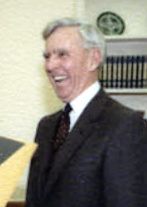William F. Bolger
William F. Bolger (March 13, 1923 - August 21, 1989 ) was the 66th US Postmaster General and held this position between March 15, 1978 and January 1, 1985.
Career
Bolger started his professional career in 1941 as a finance clerk in the old postal ministry. Later, when the United States into the Second World War entered, he served as a bombardier in the United States Air Force . After the war he resumed his work in the Post Office. During the 1950s he held a number of positions in the New England area where he became regional director for Boston . He then worked in New York from 1972 to 1975 as Regional Postmaster General for the Eastern Region . He then returned to Washington, where he held the post of Deputy Postmaster General .
During his tenure as Postmaster General, the United States Postal Service (USPS) posted its first financial surplus in more than 30 years in 1983 and its first since the Postal Reorganization Act of 1970. The USPS also made a surplus the following year, which Bolgers did last year was at the USPS. He also witnessed the emergence of e-mails, handled several labor disputes and brought in the nine-digit postcodes in order to handle the increasing volume of mail, which was mainly due to direct mail.
The USPS faced rising costs in the early years of Bolger's tenure as Postmaster General, particularly from increases in transportation and labor costs. As a result, postal rates were increased three times, including twice in 1981 when the independent Postal Rate Commission withdrew Bolger's demand for an initial freight rate of 20 cents, only to reverse its decision a few months later. Bolger also took a tough stance in negotiations in the early 1980s with the largest postal unions , including the National Postal Mail Handlers Union and the American Postal Workers Union , to keep labor costs in check. These unions participated in the first statewide strike by public employees in the United States in 1970 and went unpunished. Meanwhile, Bolger's discussions took place regarding the aftermath of the air traffic controllers' strike in 1981, when US President Ronald Reagan fired the striking members of the Professional Air Traffic Controllers Organization . When the contracts of the postal unions expired, Bolger was able to avert a strike, which, however, led to tension.
He received the J. Edward Day Award from the Association for Postal Commerce and in 1979 the Miles Kimball Medallion from the Mailing and Fulfillment Service Association .
Web links
- William F. Bolger on The New York Times page
| personal data | |
|---|---|
| SURNAME | Bolger, William F. |
| BRIEF DESCRIPTION | American soldier and US Postmaster General |
| DATE OF BIRTH | March 13, 1923 |
| DATE OF DEATH | August 21, 1989 |

